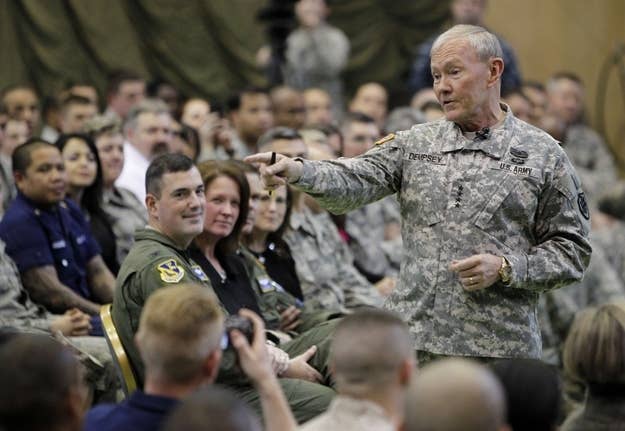
WASHINGTON — The chairman of the Joint Chiefs of Staff said on Tuesday that the military was prepared to take action in Syria after intelligence showed that the Assad regime may have used chemical weapons, but that he isn't convinced military intervention would produce the desired outcome.
"Whether the military effect would produce the kind of outcome that not just members of Congress but all of us would desire — which is an end to the violence, some kind of political reconciliation among the parties and a stable Syria — that's the reason I've been cautious, is the right word, about the application of the military instrument of power, because it's not clear to me that it would produce that outcome," Dempsey said at a lunch with reporters.
"That said, options are ready," Dempsey said. "If either it becomes clear to me, or I'm ordered to do, so we will act."
Dempsey, who just returned from a 10-day trip abroad to Asia, declined to specifically address what President Obama said on Tuesday about whether or not the United States will intervene in Syria; "I won't go into detail about what those options might be," for possible intervention, Obama said at a press conference. But Dempsey said that the military's posture on the issue has not changed.
"Nothing I've heard in the last week or so has changed anything about the actions we're taking in the military," Dempsey said. "We've been planning and we've been developing options. We're looking to determine whether these options remain valid as the conditions change."
Dempsey warned that the Syrian situation isn't quite analogous to Libya just before the fall of Moammar Qaddafi, because of the Syrian army's superior air force.
"The air defense picture in Libya was dramatically different than it is in Syria," Dempsey said. "In Syria there are five times more air defense systems, some of which are high end air defense systems. The US military has the capability to defeat that system, but it would be a greater challenge, take longer, and require more resources."
Dempsey sounded cautious about implementing the no-fly zone for which some members of Congress such as John McCain have argued, saying that there were several disadvantages to doing so.
"To be effective, a no-fly zone would have to have several elements," Dempsey said. "We would have to knock down some of the integrated air defense system of an adversary."
"They could in fact take exception to the fact that we were enaciting a no-fly zone and then act outside of their borders," he said.
"We're kind of the victims of our own success," he said. "We've made the very difficult look very manageable for a very long time."
Dempsey said he didn't recall when the initial intelligence about chemical weapons being possibly used by the Assad regime became available, and couldn't specify what the physiological samples were composed of. Like Obama, he said that the chain of custody on the weapons hadn't yet been established.
He didn't say whether the "red line" in Syria been crossed.
"I don't set red lines," Dempsey said. But, "I'm a member of the National Security Council so I do have the opportunity to express my personal judgments as these issues evolve."
